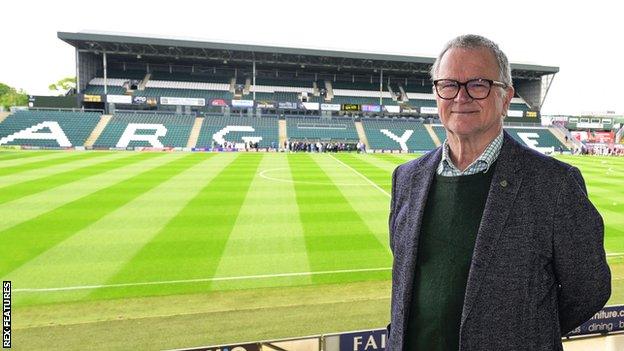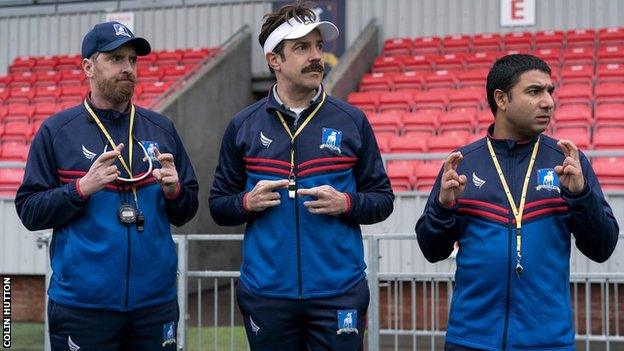Plymouth Argyle: Simon Hallett gives assurances after US investment
- Published

Simon Hallett in front of the redeveloped Mayflower Stand at Home Park which he helped pay for
Plymouth Argyle chairman Simon Hallett has assured supporters that the club will remain in his control in the long term, despite selling a 20% stake to a United States-based consortium.
Argyle Green, LLC has paid £4m for the shareholding of the League One club that is still majority-owned by Plymouth-born businessman Hallett.
The club will use the money to finance infrastructure projects which Hallett says could include work on the club's Mayflower grandstand, the first-team training ground and better facilities for Argyle's academy and women's team.
"We put the initial investment at 20% because if it all goes wrong you can't do any damage to Argyle with 20%," said Hallett, who took control of the club in 2018.
"They're going to have to prove they have the best interests of the club at heart, as they say they do, over the coming years if they're going to increase that stake.
"But for now I've got more than enough to completely control the club. My intention is very much to stay, along with the rest of the executive staff.
"This is very much a new shareholder, but it means the guarantee of continuity at Argyle so we can carry on doing what we've done very well over the past few years."
New investors 'probably going to end up being my friends'

Plymouth Argyle began the new League One season with a 1-0 win over Barnsley
Argyle fans have every reason to be wary of foreign investors - in 2008 Japanese firm K&K Shonan Management Corporation took a 20% stake in the club, external but less than three years later Plymouth went into administration, external after money promised by the firm failed to materialise.
But Hallett is confident a situation that saw the Pilgrims narrowly avoid relegation to the National League and almost go out of existence will not happen again under his watch.
"We're aware with the issues of foreign investors back in 2008, and we've taken steps to make sure that any increase in ownership is gradual after we've been able to interact with them and get to know them," he said.
"One very simple thing is that I think back in 2008 the promised money never arrived. This time it was a pre-condition for the transaction that we had proof of funds in our bank account."
He added: "In nearly a year that I've got to know them they've been to stay with me at home, I've spent a lot of time with them just chatting about life in general and I like them. They're probably going to end up being my friends, which would be fantastic."
So why would a group of US-based investors - named by the club as including Victor Hedman, Ondrej Palat, Brian and Chris Kubasik, Rudy Cline-Thomas, Jon Horst, Gary Krauthamer, David and Michael Mincberg, Nick Giannotti, Dan Kollefrath, Bradley Parker, LBM Capital, Redball Ventures and Shepard Capital Partners - want to invest in a third-tier English 'soccer' team?
"I think there's a genuine desire amongst some investors to become involved in the game with the upside that, should Argyle be promoted to the Championship, it's going to increase the value of the club if they can establish themselves there," football finance expert Kieran Maguire told BBC Sport.
"And of course there's the ultimate goal of getting into the Premier League. If fans are saying 'that's unrealistic', I don't think it is.
"If Huddersfield, Brentford, Brighton, Burnley, Wigan and Blackpool can do it, there's no reason why Argyle can't do that.
"They've got the benefits of a fairly big catchment area, they travel in numbers away and all these things are indicative of a club that has the wherewithal and opportunity to compete at a higher level.
"If they reach the Premier League the value of the club realistically goes up into the region of £150-200m, especially if you establish yourself there for two or three seasons. 20% of that all of a sudden becomes quite a nice number."
The 'Ted Lasso effect'

L-R: Brendan Hunt, Jason Sudeikis and Nick Mohammed star in Ted Lasso
Jason Sudeikis' portrayal of American 'soccer' coach Ted Lasso at fictional club AFC Richmond has been one of the biggest drivers of interest in English football in the United States in many years, so much so that the Premier League agreed a licencing deal with the Apple TV+ series reportedly worth around £500,000.
But that increased interest in the United States - where Hallett is mainly based - has led to a bigger awareness of the game in England.
"For us it's considered to perhaps be a harmless, twee, enjoyable TV programme," added Maguire, who lectures in football finance at the University of Liverpool.
"But I was teaching in New York two weeks ago and I was astounded at the number of people who came up to me and said 'what do you think of Ted Lasso, isn't it great, is there a Ted Lasso tour?'"
It is an effect that Hallett says has done his quest for more investment on the other side of the Atlantic no harm at all.
"What is Ted Lasso? It's about a club in the Premier League and the Championship, but it's about authenticity, what's real in a manager, what's real in a club and what's real in the fans," said Hallett.
"I think that's what's attracting Americans who have seen the show to want to get involved in English football. It's increasing the value of being involved in clubs outside the Premier League.
"The EFL is not terribly glamorous, but at least it's real. It's full of real fans who care about their clubs.
"It's about clubs that have owners who care about their community and it's not the kind of glam and showbiz reality TV look that the Premier League gives you, and I think that's fantastic."